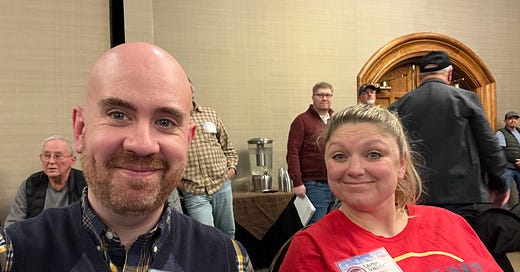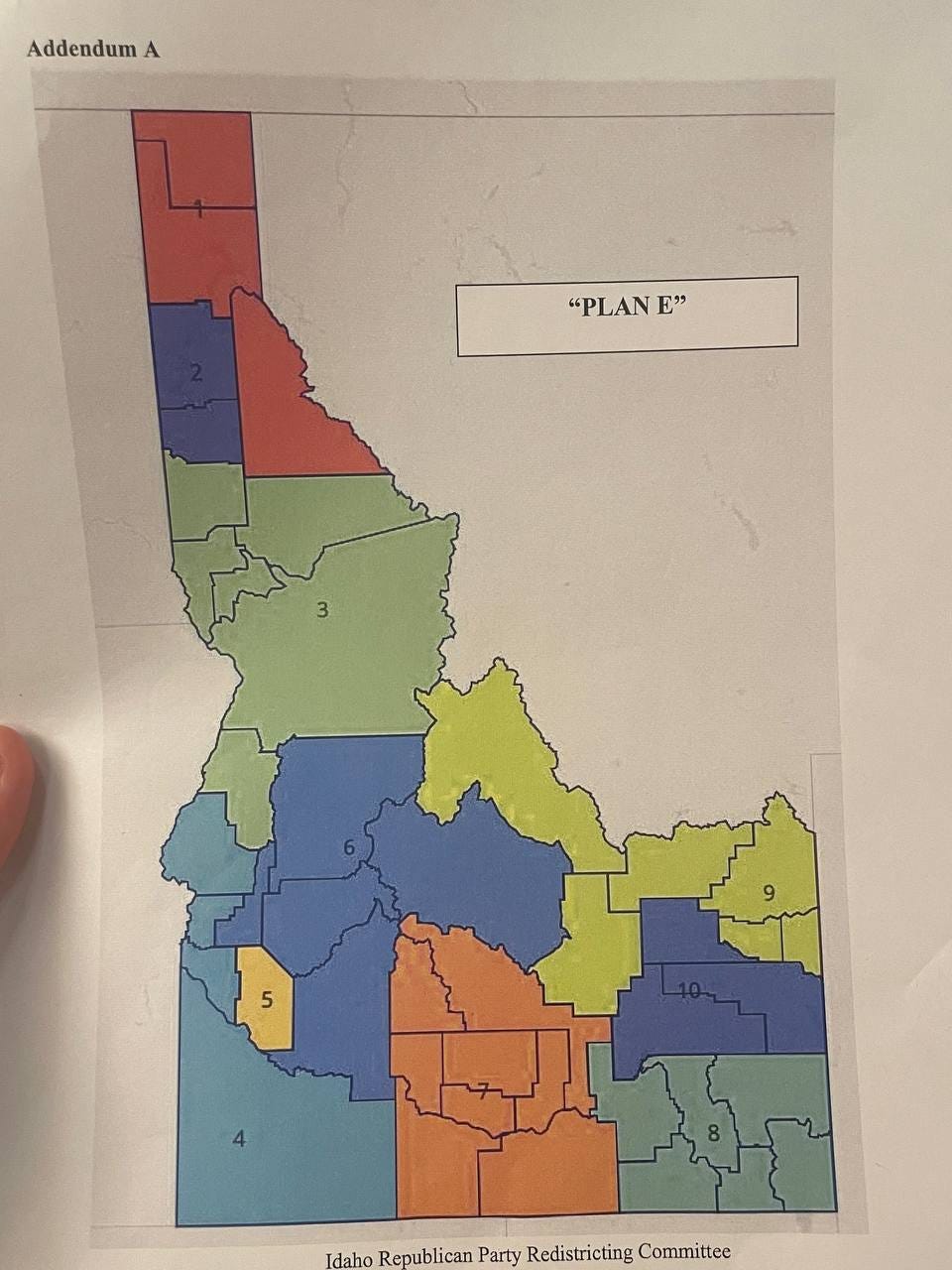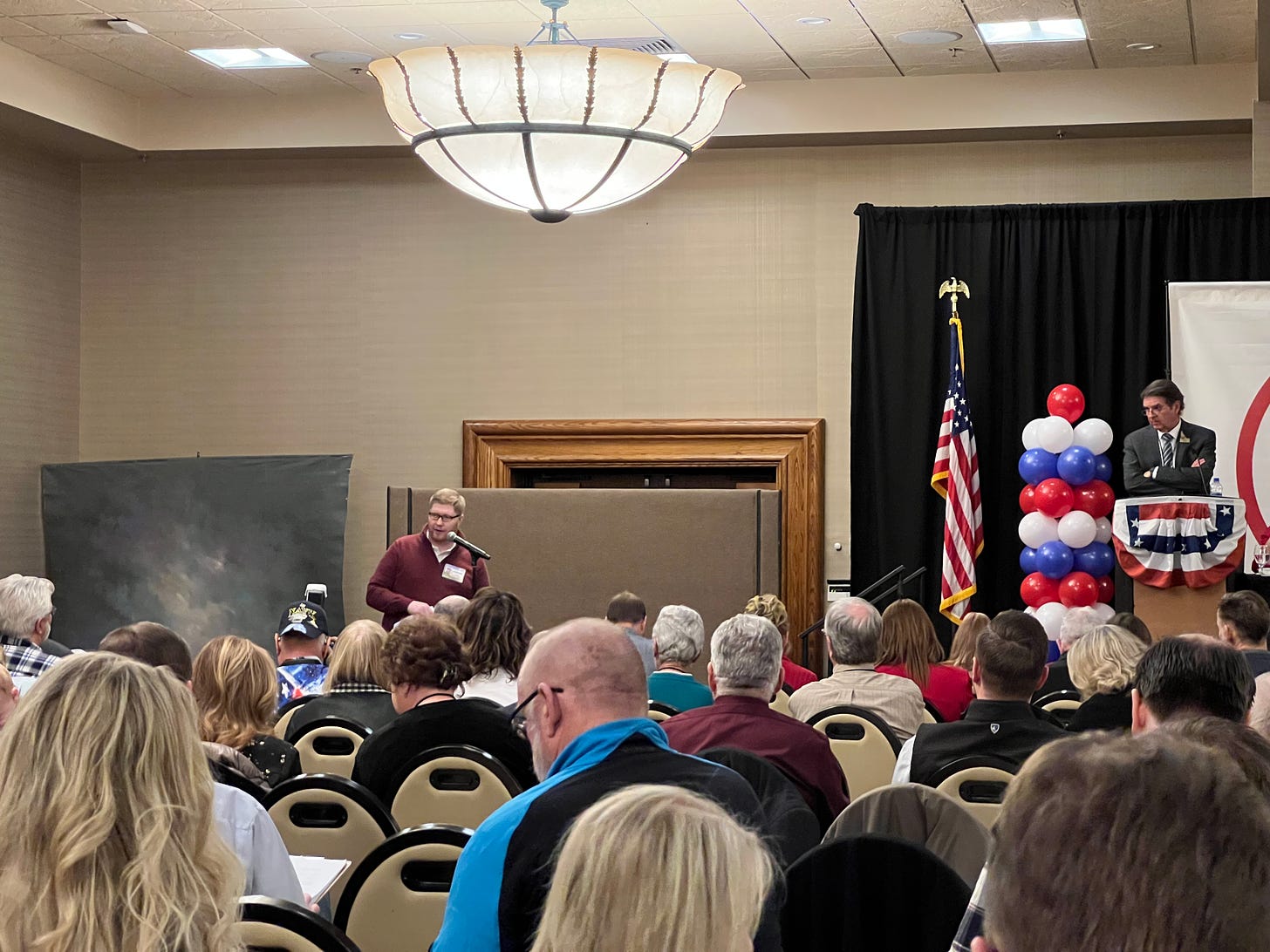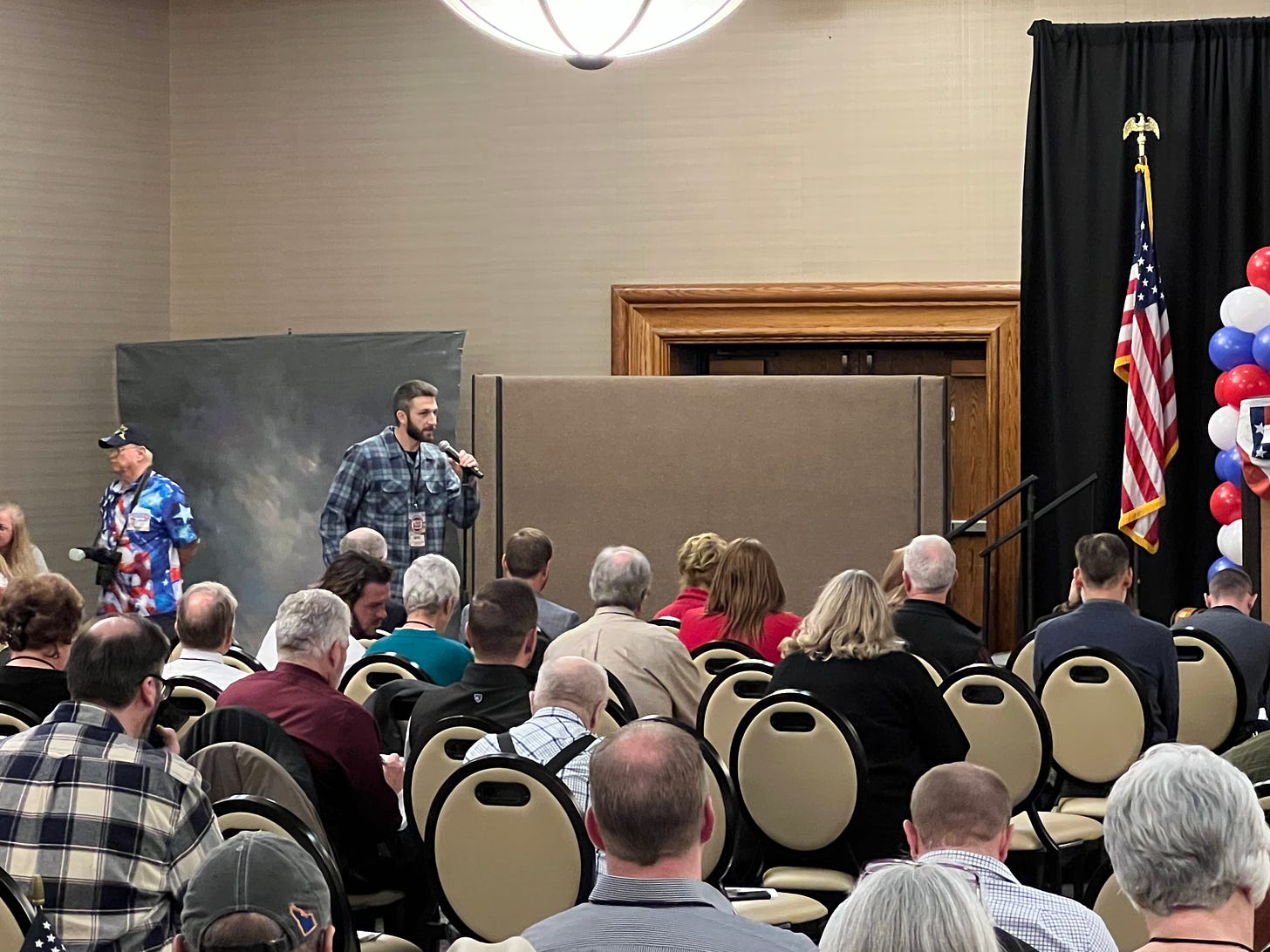Winter Meeting Day 2, Part 2: Debates
The committee debated redistricting, rules, and resolutions
This is part three of my account of the 2023 Idaho Republican Party Winter Meeting. Feel free to go back and read about the sessions on Friday evening and Saturday morning if you have not already done so. The action picks up Saturday afternoon.
After a lovely lunch with Idaho GOP Chairwoman Dorothy Moon it was time to return to business. I collaborated with fellow What’s Happening host Lauren Walker to post live updates on Telegram throughout the meeting. It was fun to generate discussion with conservative activists who could not be at the meeting. Click the link to go back and read our reports in real time.
The second General Session began with Redistricting Chair Branden Durst’s proposal to redraw the Idaho GOP’s regional boundaries. As it stands now, Idaho is divided into seven regions, each consisting of multiple districts. District chairs sit on the regional committees and elect region chairs who represent them on the State Executive Board. Ada County is unique in that it consists of a single region - Region IV - while most regions contain multiple counties.
The new map presented by the committee expands this to ten regions:
The Central Committee approved this plan with surprisingly little debate, and it will go into effect after the May 2024 primary.
Next up was the Rules Committee report. As expected, delegates pulled each rule out for its own deliberation rather than approving the package together. Branden Durst once again stepped up to the microphone to present his proposed rule against crossover voting, which had passed the Convention last summer and the Rules Committee the previous night.
Crossover voting is a tremendous problem in Idaho. Smart Democrats understand the reality of living in an 80/20 red state: the real election is not in November. It makes tactical sense for them to switch their affiliation so as to vote in the Republican primary, selecting either a candidate they think is weaker for the general election, or picking the more moderate option. On the other hand, we as the Republican Party have every right to police our own organization. Closing down the primary to allow only registered Republicans was a good start, but it does not do anything to stop people from tactically switching their affiliations.
Indeed, prominent Democrats have urged their followers to do just that. In October 2021, the Idaho Statesman’s opinion editor urged leftists to register as Republicans to stop supposed extremists from winning GOP primaries. Last February, the Spokesman-Review wrote a glowing profile of Kootenai County Democrats who affiliated as Republican to interfere in the primary. Even former Idaho Supreme Court Justice Jim Jones, who used to be a prominent Republican but is now neither, urged leftists to register Republican and vote in our primary.
Durst’s initial proposal would have prevented anyone from voting in the GOP primary if they had in the previous 25 months disaffiliated, donated to another party, voted in another party’s primary, or donated to another party’s candidate. The version that came out of the Rules Committee was somewhat watered down, removing the toughest restrictions while leaving in a provision to disallow participation in the primary from anyone who was not affiliated with the GOP before the end of the previous year.
The other section of the new rule would explicitly allow county central committees to endorse candidates in a primary election. This has been a major point of contention in the Republican Party lately. Kootenai County, for example, investigates and interviews candidates prior to the primary and issues recommendations based upon the vote of the PCs. Ada County, on the other hand, makes a point of staying out of primary races, at least officially. The new rule allows county committees to follow Kootenai’s lead if they so choose, without being disciplined or even sued as Bonneville County was last year.
Overall I believe this rule is a good attempt to fix some vexing problems in our primary system. It is not perfect, but we can watch how it plays out over the next two years and come back with something even better at the next Convention.
The next major rule involved the quota, a proportional system wherein county committees pay dues to the state party to cover operational costs. Some counties proudly pay their quotas, while others, such as Ada, claim that the amount of work they do themselves on behalf of statewide candidates should be considered a credit against the quota. State Treasurer Steve Bender proposed a rule that would alter this into a dues system, where counties would be required to pay lest their State Convention delegates be assessed the debt.
Bender himself had second thoughts about the enforcement mechanism, and moved to strike it from the rule during floor debate. The Central Committee disagreed, however, and voted to adopt the rule with the enforcement mechanism intact. It was interesting to see Steve Bender and Ada County GOP Chair Victor Miller arguing on the same side of an issue for once.
I will have more to say about these funding issues later, once I gain a deeper understanding of everything that is involved.
The biggest debate of the day was of course regarding whether or not the heads of three affiliate organizations should have voting rights on the State Executive Board. Kootenai County GOP Youth Committeeperson Dan Bell presented the proposal to the committee after shepherding it through the Rules Committee the night before. That committee had made one alteration to the proposal, suggesting that the State Finance Chair should also become an ex oficio member, since that position is appointed by the State Chair rather than being elected. I thought it a reasonable accommodation.
The heads of the three private clubs obviously opposed the proposal. College Republican Farhana Hibbert testified against the rule, reading a speech from her phone. Jake Miller, Idaho Young Republicans Chair, argued that we are already losing the youth vote, and this rule would make it even worse. In her report to the committee earlier that morning, Republican Women President Tracey Wasden claimed that women in her organization gave more than 43,000 volunteer hours to the party (though one must wonder how many of those hours were on behalf of Democrat Tom Arkoosh, considering that past IFRW president Patti Anne Lodge is still listed as a prominent supporter of the failed AG candidate).
Another delegate - I did not catch his name - spoke in favor of the proposal, pointing out that young people, women, and college students are already represented in the party, and therefore do not need extra representation on the Executive Board. Nina Beesley of Kootenai County pointed out that the affiliate clubs have looser rules than the party itself, making it easier for out-of-state residents or even Democrats to have influence over our party. The most fiery speech of the day came from longtime Republican activist Ronalee Linsenmann, who said that if your commitment to Republican values is so shallow as to rest upon whether or not these clubs have voting rights on the Executive Board then we don’t want you anyway.
Perhaps realizing that the proposal was on the verge of passing, 1st Vice Chair Daniel Silver moved to postpone further debate until the Summer Meeting. Both the voice and standing votes were too close to call, so a counted vote took place, in which the committee approved the motion to postpone 104-102. I was hoping someone would call for a roll call vote, just to be sure, but nobody did, and the committee moved on.
The proposal, therefore, is tabled for another six months. The affiliate clubs will spend that time rallying support for the status quo, while advocates for a change will be rallying support as well. I’ll let you know when something changes!
There were several other rules approved by the committee, including strengthening the residency requirement for state officers, allowing more leeway for chairs to host electronic meetings, and reorganizing the function of the Judicial Committee. There will be time to observe how they play out over the next few years, so I don’t want to bore you with the details - this post is already long enough.

The most disappointing part of the meeting came at the end. With only half an hour left, and more than twenty resolutions to approve, Gretchen Clelland of Twin Falls divided the question, pulling every single resolution out for individual debate. This was an extremely underhanded move, considering most of them had passed with unanimous support of the Resolutions Committee, and most would have easily passed with little debate on the floor. As a result of this action, the committee only had time to approve three resolutions before coming up against a hard deadline.
A resolution against ranked choice voting passed overwhelmingly. A resolution against genital mutilation of children passed unanimously. A resolution against legislative chairs unilaterally killing bills passed as well.
With the clock ticking, Resolutions Committee Chair Christy Zito and Kootenai County Chair Brent Regan moved to postpone the rest of the resolutions to the Summer Meeting. This would at least keep them alive, rather than forcing them to be resubmitted and argued through the committee again. Someone from Elmore County tearfully asked that her resolution against a freeway be heard, and the committee acquiesced. Region I Chair Bjorn Handeen was waiting in line to present his resolution against US support for the Saudi war in Yemen when time expired.
I felt that this was an awful way to end what had been up until then a very good meeting. I don’t know Ms. Clelland, but she has made a very bad impression on me this weekend. There was absolutely no reason to divide the resolutions. If you want extra debate on one or two, pull them out and leave the rest to be passed by acclimation. This devious action reminded me of when another Twin Falls Republican called for a quorum check at the 2022 State Convention and then immediately advised everyone to leave, hoping to end business without passing any resolutions. Is there something in the water down there?
The busy weekend ended with the Inaugural Ball at the Capitol and the Winter Gala at the Ambrose School. I missed the former but had the pleasure of attending the latter, where my wife and I had a lovely time visiting with conservative Republicans from throughout the state.
There is no time to rest. The 2023 Legislative Session begins today, Capitol Clarity returns every Thursday, and the conservatives on the Senate Education Committee are hosting a town hall meeting next Thursday as well. I will do my best to bring it all to you!









Fantastic reporting, Brian. Thank you for doing what the rest of us never could (or would) do as well.
I was disappointed that so much kicking the can down the road to summer meeting occurred. However, most of the changes were positive.
Lots more pushing will be needed to restore full sanity to the party and move Idaho back to its core conservative values. Having you on the job gives me hope.
Well done, Sir, thank you.🇺🇲